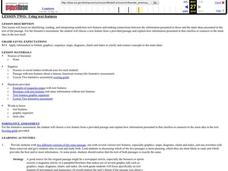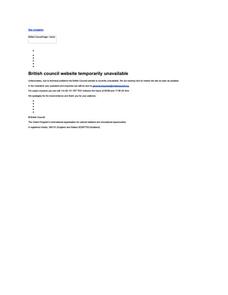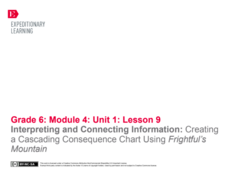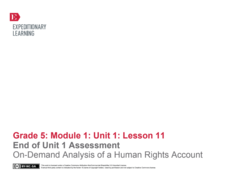EngageNY
Grade 9 ELA Module 3, Unit 1, Lesson 4
Can dogs feel shame? Explore the anthropomorphic connection between human emotions and animal behavior—or lack thereof—with a lesson about Temple Grandin's book, Animals in Translation. Ninth graders continue a close reading of chapter...
What So Proudly We Hail
Life, Liberty, and the Pursuit of Happiness: A Lesson on the Declaration of Independence
What does it mean to say that a right is unalienable? How did the founding fathers convey this revolutionary concept in the Declaration of Independence? Engage in a close reading and analysis of the Declaration of Independence, and...
Literacy Design Collaborative
"New American Characters" - Analyzing the Impact of Cultural Change in "The Great Gatsby"
Learners annotate text from The Great Gatsby before working through a character development map. They then use text evidence in a final essay to describe the connection between central ideas and character development.
EngageNY
Grade 9 ELA Module 2, Unit 2, Lesson 12
Ninth graders demonstrate their understanding of a central idea in Oedipus the King with a mid-unit writing assessment. Writers formulate a claim about the connection between prophecy and Oedipus's actions and craft an in-class essay...
EngageNY
Grade 9 ELA Module 2, Unit 2, Lesson 16
Was Oedipus' destiny determined by fate or by his actions? Using details from the text, ninth graders delve into a critical thinking exercise based on Sophocles' Oedipus the King. Now that Oedipus has learned his true identity, readers...
National Constitution Center
Thirteenth Amendment Poster
President Lincoln believed in the Thirteenth Amendment so strongly that he signed 14 copies of it, but died before he could see it passed on December 18, 1965. Explore the text that forever abolished slavery in America with a document...
EngageNY
Getting the Gist and Determining Word Meaning: Paragraphs 20–23 of Steve Jobs’ Commencement Address (and connecting to Chapter 10)
Groups create a list of the character traits of Steve Jobs and Buddy, the main character of Christopher Paul Curtis' Bud, Not Buddy, and share and select evidence from Jobs' 2005 Stanford University Commencement Address to support their...
EngageNY
Grade 9 ELA Module 3, Unit 3, Lesson 4
The fourth activity in a unit on crafting a research paper focuses on cohesion within and between paragraphs. Class members examine models that lack cohesion and ones that are cohesive and logically developed before using what they have...
EngageNY
Grade 9 ELA Module 2, Unit 2, Lesson 8
Prophecy and blindness often go hand in hand, as in Sophocles' Oedipus the King. Explore Oedipus' thoughts about prophecy, fate, and responsibility with an activity focused on the discussion between Creon and Oedipus regarding the murder...
EngageNY
Grade 9 ELA Module 4, Unit 1, Lesson 11
As part of a study of how writers structure their text so that readers understand events, class members do a close reading of "Is It Lawful to Make Slaves of Others Against Their Will?" a chapter in Aronson and Budhos' Sugar Changed the...
Curated OER
Using Text Features
Fourth graders read a nonfiction story that is presented to them with graphic features, and presented to them with only the text. In this text features lesson, 4th graders decide what the benefits of text organizers are and create their...
EngageNY
Mid-Unit 2 Assessment: On-Demand Informational Writing
Lesson 7 focuses on building academic vocabulary and writing an explanatory letter with supported textual evidence. For the first five minutes of the lesson plan, the educator reminds the class of how to read and refer to the accordion...
Core Knowledge Foundation
Unit 8: Treasure Island
Treasure Island by Robert Louis Stevenson is the focus of the final unit, emphasizing reading, writing, grammar, morphology, and spelling. Fourth graders read and discuss a chapter with every lesson, followed by word work—prefixes,...
Curated OER
Simple Texts for Primary Pupils
Can literacy get any more fun than this? Learners not only have fun, but gain confidence as well when presented with familiar text in another language. Select books, songs, poems, even recipes written in another language, and using the...
Curated OER
Teach Text Structure for Nonfiction
Students explore the patterns of text structure to anticipate the kind of information that a reading might present. The lesson examines some of the components of reading writing and using nonfiction.
EngageNY
Main Ideas in Informational Text: Analyzing a Firsthand Human Rights Account for Connections to Specific Articles of the UDHR
Lesson 10 in a series of human rights lessons focuses on the skills of finding evidence and summarizing. Your young readers work to compare the two texts they have read in this unit: the Universal Declaration of Human Rights...
EngageNY
Interpreting and Connecting Information: Creating a Cascading Consequence Chart Using Frightful’s Mountain
Decisions, decisions. Scholars take a close look at making decisions by discussing the character Sam in chapters one through eight of Frightful’s Mountain. Partners discuss whether Sam should interact with Frightful and then complete a...
EngageNY
End of Unit 1 Assessment: On-Demand Analysis of a Human Rights Account
The last instructional activity in this unit about human rights consists of a final assessment. To demonstrate the skills your class has acquired throughout this unit, they will work with a new article entitled "From Kosovo to the United...
EngageNY
Main Ideas in Informational Text: Analyzing a Firsthand Human Rights Account
Although this is part of a series, lesson plan nine has your class take a break from their close study of the Universal Declaration of Human Rights (UDHR) text to read the firsthand account “Teaching Nepalis to Read, Plant, and Vote” by...
National Math + Science Initative
Reading an Informational Text: "It All Started with Sputnik"
Sputnik was one of the greatest scientific advancements of the 1950s, and this reading lesson plan does it justice. Pupils start off with pre-reading questions and a video. They then read an excerpt from an article, which is accompanied...
Scholastic
Persausive Writing
A unit on persuasive writing guides elementary learners through the writing process. The first part examines the elements of persuasive writing, including expressing an opinion, connecting ideas, using supporting facts, and writing...
EngageNY
End of Unit Assessment: Fishbowl Discussion
Is it worth it? Scholars complete the end of unit assessment by participating in a fishbowl discussion to consider if the benefits of DDT outweigh the consequences. They reflect on their discussions by completing an exit ticket.
National Museum of the American Indian
The A:Shiwi (Zuni) People: A Study in Environment, Adaptation, and Agricultural Practices
Discover the connection of native peoples to their natural world, including cultural and agricultural practices, by studying the Zuni people of the American Southwest. This lesson includes examining a poster's photographs, reading...
Houghton Mifflin Harcourt
One Land, Many Trails: English Language Development Lessons (Theme 5)
English is not the only subject that requires its own set of vocabulary words—geography does too! A series of language development lessons designed to be used with Theme 5: One Land, Many Trails helps introduce readers to key vocabulary...

























